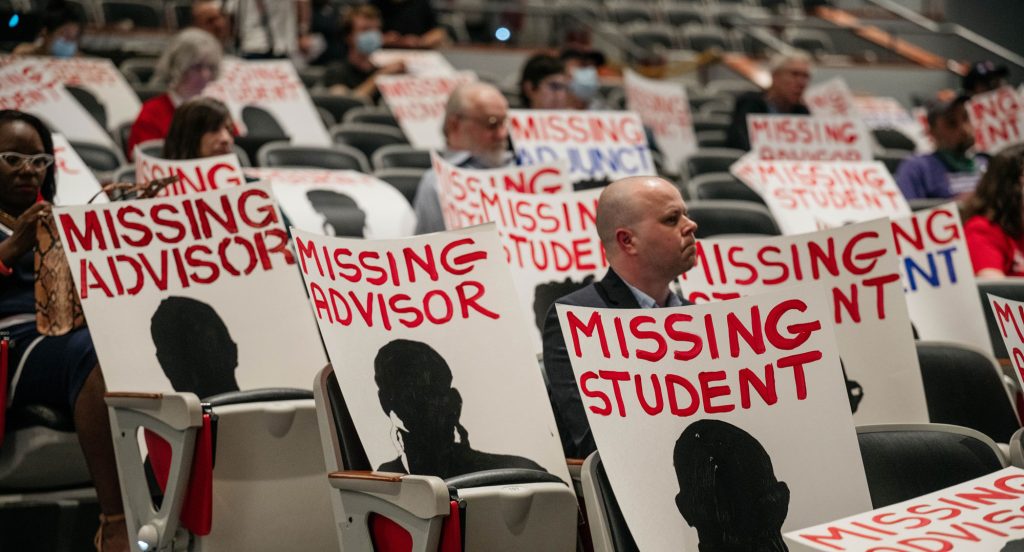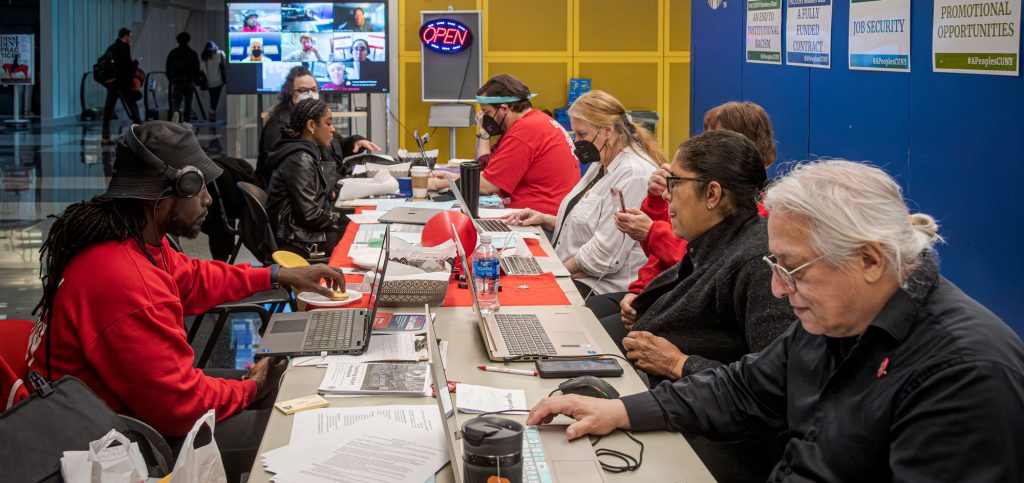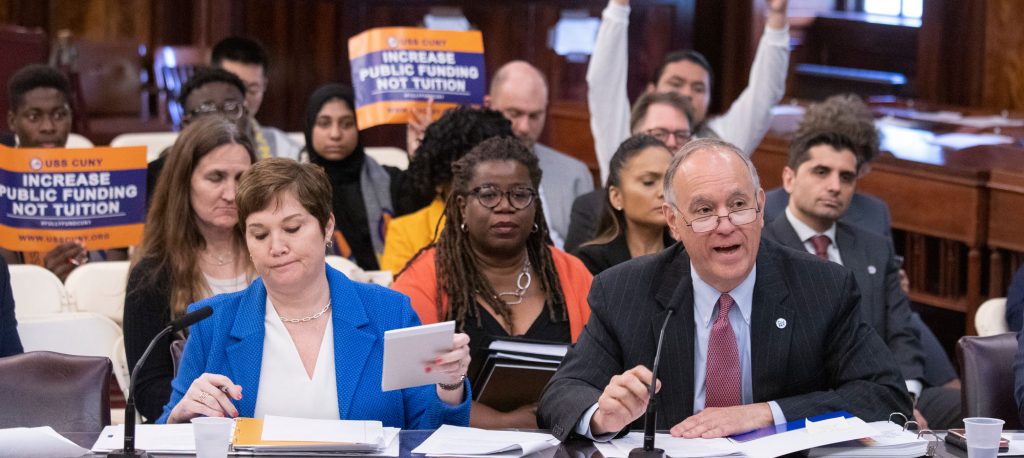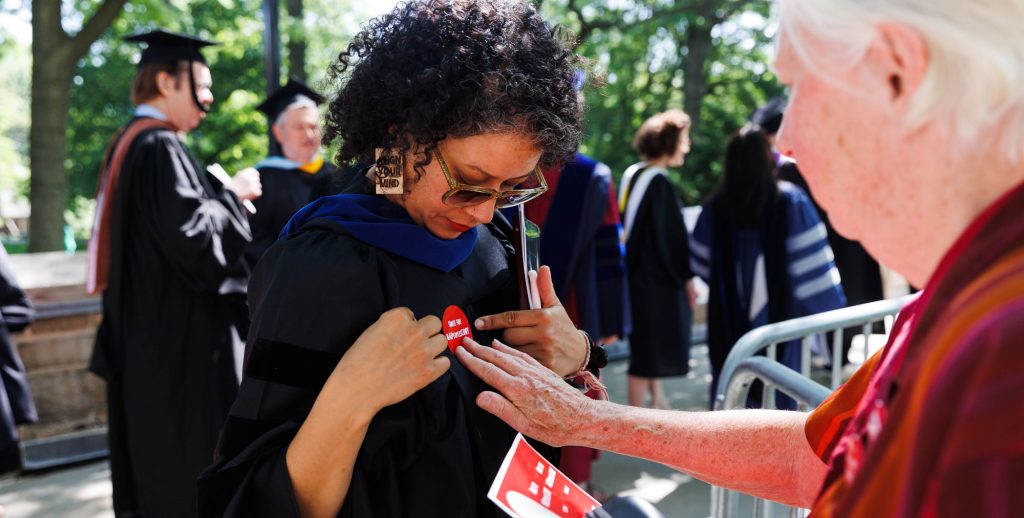
PSC members attend a CUNY BOT hearing at LaGuardia Community College. They placed posters of ‘missing students’ and ‘missing adjuncts’ to represent the effects of administrative cuts. (Credit: Scott Heins)
Jonathan Cope, a PSC delegate from the College of Staten Island (CSI), looked over the sea of members who were prepared to march through the campus to demand more investment in CUNY.
“This is one of the first events that we’ve had together in person on campus since the pandemic. I know that there are a lot of people in different departments and different offices, and they have been feeling pretty demoralized as a result of all the austerity,” said Cope, an associate professor and librarian at CSI. “It’s also important that we all have some moment where we all come together to share what we’ve been through the past couple of years and give people the space to reconnect and talk about what they’ve experienced.”
CSI PSC chapter chair, Jason Bishop, rallied the crowd.

College of Staten Island members march to demand more investment in CUNY. (Credit: Paul Frangipane)
“We’re going to march because CUNY administration knows that we’re here. We’re going to march to Victory Boulevard, so that everyone on campus knows that we’re here and so that everybody who drives by this college knows we’re here,” he said.
Members echoed the urgency. “If we don’t stop the effect of disinvestment there’s going to be a downward spiral,” said Alyson Bardsley, an associate professor of English at CSI.
The CSI demonstration was a part of a month of action by PSC members against the austerity cuts imposed by the CUNY Central administration, including hiring freezes and requests that colleges submit savings plans. In May, members at John Jay College, Lehman College and City College held on-campus “grade-ins,” a public display of the hard work faculty do, despite a lack of adequate resources and pay.
“A grade-in makes the invisible visible, demonstrating in real time in a public space the work that dedicated college faculty do outside the classroom,” said Lehman College PSC delegate Ruth Wangerin, who helped organize the grade-in on her campus. “The college administration and the public need to know that we do the essential work without which there is no education. They also need to see that we’re unionized and expect to be treated with the respect we have earned. The Lehman grade-in was held right inside the main entrance to the administration building, so there was no way our message was missed.”

Members at John Jay participate in a grade-in. (Credit: Erik McGregor)
On May 8, dozens of PSC members packed into the LaGuardia Community College auditorium for a Board of Trustees hearing. They placed posters of “missing students” and “missing adjuncts” in empty seats to represent the devastation of the administration’s cuts. Member after member told the trustees that in order to serve students, the University must end its budget cuts and hire more faculty and staff. PSC members advocated for the board and the university administration to enact the following:
- Begin contract negotiations with the PSC immediately (the contract expired at the end of the February).
- Fill faculty and staff vacancies.
- Fight the mayor’s proposed cuts to community colleges.
- Reverse spending cuts across CUNY.
- Support the New Deal for CUNY state legislation that would return CUNY to being tuition free and fund hiring for more full-time faculty and staff.
MORE STAFF
Cindy Bink, director of counseling at City Tech, spoke about one of the central parts of the New Deal for CUNY legislation: the need for more full-time mental health counselors. “We need these positions because counselors must carry with them institutional knowledge that helps build ongoing relationships with students, faculty and staff and helps to create a community of support,” Bink said. “This is critical to student retention and degree completion. We already employ a high proportion of part-time staff and trainees. Overreliance on part-time staffing at low hourly wages or on outside contracted services tends to fragment efforts and produce large overhead costs related to excessive planning, recruitment, hiring, training, supervision and turnover. This results in compromised quality of services and insufficient continuity of care.”
She added, “As the COVID-relief funds are drying up, many of our centers are losing significant staffing, making this a vital moment to invest in our work. On June 30, we will lose around 40 full-time equivalent clinicians across the CUNY Counseling Centers. This equates to not being able to serve 13,000 students who need our help.”
In an especially emotional testimony, Jasmina Sinanovi´c, an adjunct teaching at several campuses, spoke about how the cuts were hurting long-time adjuncts.
“I am an adjunct lecturer at [City College of New York (CCNY)] since 2007. I was also a student of CUNY. I am also an immigrant, a nonbinary human and a war survivor. I am here to remind you I am not a number,” Sinanovi´c said. “At the end of Spring 2020, Bronx Community College laid me off. [Because] I qualified for a three-year contract, I was too expensive for them. As an adjunct, I was expendable. In the middle of the pandemic, I was to be left without health insurance. Thanks to CCNY I did not [lose my insurance] but many of my colleagues did. It is now May again, and we are threatened again. How are we to support our students when we are not supported? How are we to focus on teaching when we are repeatedly threatened?”

CUNY students protest austerity as Chancellor Félix Matos Rodríguez (right), testifies at City Council. (Credit: John McCarten/NYC Council Media Unit)
VITAL SERVICES
Laura Tanenbaum, an English professor at LaGuardia Community College, said that cuts at CUNY are leaving students without the critical services they need. This situation is especially brutal, she said, because many students are in economically precarious positions.
“While CUNY cannot single-handedly fix all of these problems, having well-funded schools, properly maintained buildings, small class sizes, adequate academic and personal counselors are invaluable,” she said. “As an open admissions school, LaGuardia is a rare place that takes students where they are, which can mean offering childcare, a food pantry and immigration help along with the academic resources of a world-class university. None of this is possible with the preemptive cuts this board has called for at a time when need has never been higher.”
Kevin Kolack, a chemistry lecturer at Queensborough Community College, noted that the ongoing austerity at CUNY has led to a loss of faculty at his campus. “[W]e’ve lost 15% of faculty in my department and there are no plans to replace them. We are stretched thin. Austerity budgeting is driving good instructors out of higher education, and they are being replaced with nothing.”
ADDED WORK
Stuart Davis, PSC chapter chair at Baruch College, told a similar story. “I’m frustrated and saddened when hearing about jobs that were not filled this year. I’m concerned when faculty colleagues tell me that a full-time line in their department that would potentially help them maintain accreditation is frozen indefinitely,” he said. “I’m saddened when I hear about staff colleagues in areas like adjunct services retiring. Why? Because I know they will not be replaced, and their work will be redistributed among existing employees, creating additional workload pressures on active members.”
The University also needs to invest in college laboratory technicians (CLTs), said PSC CLT Chapter Chair Jeanette Batiz. CUNY must raise salaries and fill nearly 500 vacancies in order to address student needs, she said.
“The CLT salary schedule experienced a significant need to increase severely depressed wages and other factors. CUNY [CLT salaries have] led to a widening financial gap that is not only unaffordable for living in the New York metropolitan area, but does not consider the significant increases in workload placed upon, demanded, and required of CLTs,” Batiz said. “Across CUNY, the number of CLTs is rapidly declining, thus affecting workforce stability, growth, retention and safety of all concerned. College laboratory technicians continue to be deprofessionalized and hollowed out at CUNY with no end in sight.”

Members pass out anti-austerity stickers at this year’s commencement ceremony at Lehman College. (Credit: Paul Frangipane)
STUDENT SUPPORT
Students have joined the PSC’s efforts. At the CSI demonstration, Rachel Ishyaguyev, a senior psychology major, said she marched with the union to defend CUNY’s mission. An immigrant from Central Asia, she’s the first in her family to go to college in the United States. She’s been able to do it with financial aid, but her aid has been cut this year. As a result, she picked up work as cognitive and behavioral trainer for disabled kids.
“The purpose of CUNY seems to have disappeared,” Ishyaguyev said, “to get a quality education for students who can’t afford it.”
PSC members from across the university amplified the message that CUNY faculty and staff can’t continue to do more with less. The university and its students will suffer.
Published: June 21, 2023

